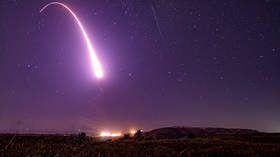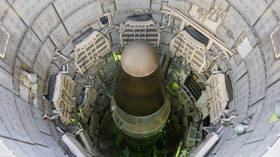US makes call on nuclear missile test

US defense officials have canceled a planned test of an intercontinental ballistic missile to reduce the risk of catastrophic “misinterpretation or miscommunication” at a time when Russian nuclear forces are on high alert amid Moscow’s military offensive in Ukraine.
The decision against testing the LGM-30G Minuteman III missile was first reported on Friday by Reuters, which cited comments from a US Air Force spokeswoman. It comes a month after the same test was delayed because Russian President Vladimir Putin had ordered his country’s nuclear deterrent forces to be in a higher state of readiness, or “special regime of combat duty.”
The ICBM test has now been called off altogether for the same reasons, Air Force spokeswoman Ann Stefanek said.
“The Air Force is confident in the readiness of the strategic forces of the United States,” Stefanek added, noting that the next such test is scheduled for later this year.
Pentagon spokesman Todd Breasseale also confirmed that the test was called off on concern that Moscow would view it as escalatory. He told NBC News that the launch had been delayed “due to an overabundance of caution to avoid misrepresentation or miscommunication during the ongoing Russian invasion of Ukraine.”
The Pentagon has criticized Putin for ramping up the readiness of Russian nuclear forces, calling the move “dangerous, irresponsible and unnecessary.” When announcing the delay last month, Pentagon spokesman John Kirby said the move was made to “demonstrate that we are a responsible nuclear power.” At the time, Kirby similarly insisted that the decision wouldn’t undermine the readiness of US nuclear forces.
Putin has said that “aggressive statements” by NATO and the West’s sanctions war against Russia made heightened nuclear readiness necessary.
The silo-launched Minuteman III can carry multiple warheads and strike separate targets miles away from each other. It has a range of more than 6,000 miles and can travel at 15,000 miles per hour. The missile was first deployed in 1970, and production ceased in 1978. The Air Force has 400 active Minuteman III missiles in its inventory and typically does four test launches each year.
US officials aim to start testing a replacement for the Minuteman III, the Ground-Based Strategic Deterrent (GBSD) missile, by the end of 2023. The full GBSD fleet is scheduled to be in place by 2036, meaning that the missile, which was originally designed to be in service for 10 years, will have been on the job for as long as 66 years.













